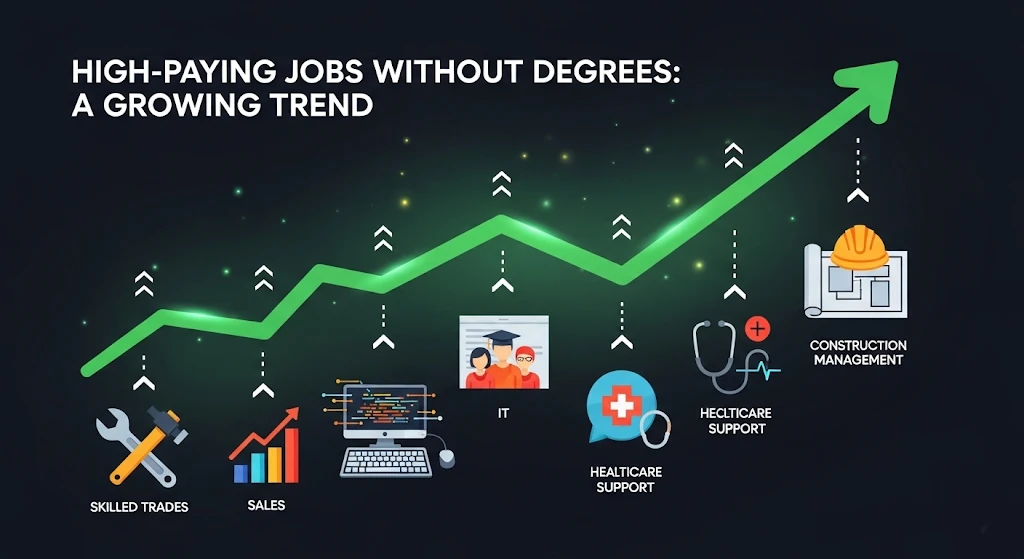
Making good money without a degree might sound impossible at first, especially when we’re used to hearing that university is the only path to high earnings. But in the UK today, things are shifting. Many employers are less focused on certificates and more interested in skill, drive, and results. Some of the best-paying careers don’t even ask for a degree. Instead, they value experience, training on the job, or industry-specific qualifications that are much quicker to get.
If you’ve been wondering whether it’s really possible to land a high-earning role without four years of university debt, the answer is yes. And some of these paths may surprise you.
Why High-Paying Jobs Without Degrees Are Growing

For years, traditional careers like law or medicine dominated the idea of success. But in the last decade, the UK economy has leaned heavily on trades, technology, logistics, and even creative industries. These sectors care more about what you can do than where you studied.
Employers are filling gaps with workers who have real-world skills and a willingness to learn.
With
- Apprenticeships
- short courses
- self-taught expertise
people are finding doors open in places that once seemed out of reach. The rise of gig platforms and freelance work has also changed the game, letting workers build up strong incomes without formal degrees.
Skilled Trades: The Hidden Goldmine
When people think about high salaries, trades aren’t always the first thing that comes to mind. But ask around and you’ll find electricians, plumbers, and gas engineers earning more than many office-based graduates.
You can take the example of a plumber. A busy plumber in London can make £40,000 to £60,000 a year once established.
Electricians can often reach similar levels and with overtime or specialised contracts, the numbers climb even higher. The demand for skilled workers is constant because these are the jobs people can’t live without. Pipes burst, power fails, heating breaks — and when that happens, those who can fix it name their price.
Transport and Logistics: Driving Success
The logistics industry has grown massively with online shopping. In this field people like
- Lorry drivers
- Delivery managers
- Transport coordinators
They keep the system running because a heavy goods vehicle (HGV) driver can earn £30,000 to £45,000 annually depending on their experience and routes.
It might not sound glamorous, but it’s steady, essential work with strong pay and plenty of overtime opportunities. Some specialist driving roles — like fuel tanker drivers — often push salaries far higher. For many, the training to get licensed is a fraction of the cost of university and takes only a few months.
Technology Roles Without a Degree

Tech is often linked with computer science degrees, but the reality is different. Many of the UK’s coders, developers, and IT specialists are self-taught. Employers increasingly run coding bootcamps or accept portfolios over academic certificates.
- Web developers
- Cybersecurity analysts
- IT support engineers
Can all build strong careers without a degree. In London, an experienced cybersecurity specialist can command £50,000 to £70,000. The key here is proof of skill — projects you’ve built, security problems you’ve solved, or systems you’ve managed. Once that’s clear, your income potential grows quickly.
Real Estate and Property Roles
Another area where a degree isn’t required is property. Estate agents and property managers often earn more from commissions than a fixed salary. A motivated estate agent in a busy city can make £40,000 to £60,000, with top performers earning six figures.
This path is more about personality, networking, and sales skills than formal study. If you’ve got confidence and people skills, the property market can be a goldmine.
Public Services and Security
You don’t always need a degree to land a solid job in public services. Take the police, for example. In the UK, once you’ve been in the force a few years, pay usually moves into the £30,000–£45,000 range, and higher ranks go well beyond that. Firefighters and paramedics follow a similar route — you start out on a modest wage, but it climbs steadily with time and responsibility. Even the military has paths where steady service pays off without needing a university background.
Security is another space that’s grown quickly. Private bodyguards, surveillance workers, or contractors hired by big companies can earn very good money. The training is tough and practical, but it’s direct — no years of lectures or student debt involved.
Construction Management and Site Work
Construction is one of the UK’s backbones, and skilled site managers are highly paid. Many start as labourers or apprentices, learn the ropes, and work their way up. By the time someone becomes a site supervisor or project manager, salaries can easily range from £40,000 to £70,000.
It’s a career where experience carries as much weight as qualifications. The industry rewards those who can handle responsibility and keep projects running smoothly.
Creative and Freelance Paths
Not all high earners work in offices or on construction sites. Some build success through creative fields like photography, design, or media. While income can vary, those who establish a name often outpace traditional jobs. Freelance photographers, for example, can charge premium rates for weddings, commercial shoots, or media campaigns.
Digital marketing has also opened doors. Social media managers and content creators with proven results don’t need degrees to land contracts worth thousands. In fact, many employers prefer someone with a proven track record over a certificate. And for those just starting out, there are even no experience remote jobs that offer a foot in the door — perfect for people who want flexibility and a chance to build income from home.
Sales and Business Development
Sales is one of the oldest routes to high earnings without formal study. From car dealerships to corporate software sales, commissions can take salaries well beyond the £50,000 mark.
In business development roles, relationship-building matters more than academic background. The best salespeople are often natural communicators who thrive under pressure and can turn opportunities into contracts.
The Value of Apprenticeships
For a lot of people the best move after school is not university at all but it is an apprenticeship. These programmes give you real training from day one and you get paid while you learn. You don’t have to sit in lecture halls for years, just hands-on work in fields like engineering, IT, construction, or even finance. Stick with it and the pay can grow fast once you’ve built up a bit of experience.
Another big plus? You’re not saddled with a mountain of student debt. Instead, you finish with practical skills that employers actually need and often a job offer waiting for you.
Final Thoughts
The old idea that you must have a degree to make good money in the UK doesn’t really hold anymore. Skilled trades, delivery and logistics, tech roles, property, sales — there are plenty of ways to earn a strong living without stepping foot in a university classroom.
All of these careers have one thing in common: success depends more on what you can do than on what’s written on a certificate. Maybe you’re repairing boilers, building websites, selling houses, or running a busy construction site — if you’re good at it, the rewards are there.
So if uni isn’t on your path, don’t stress. There are still loads of options open, and quite a few of them pay better than people expect.
